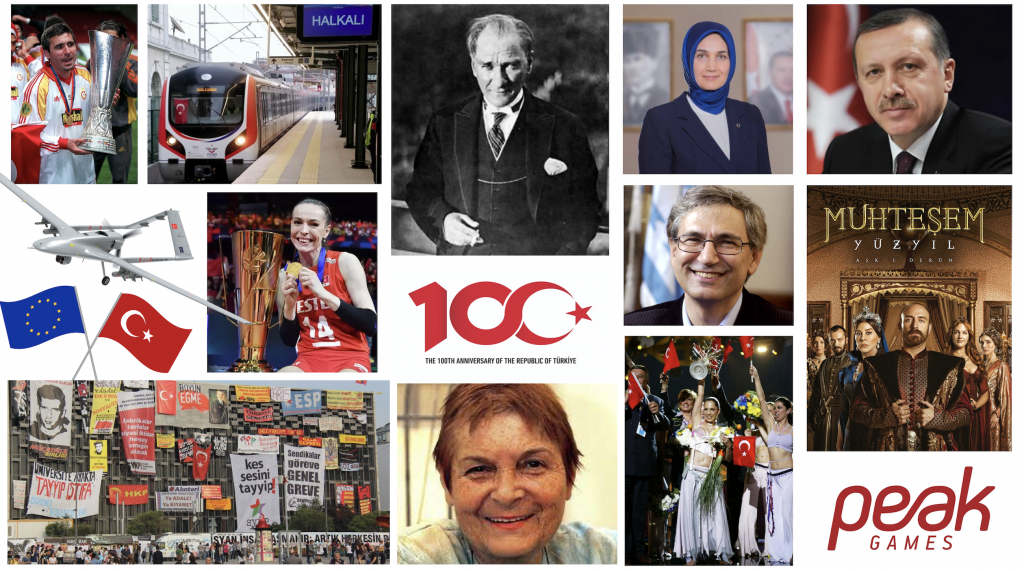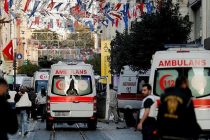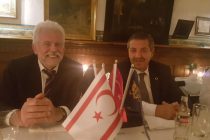Sunday, 29 October 2023 marked exactly one hundred years since the Republic of Türkiye was proclaimed. The centenary saw celebrations not only across Türkiye, but also by Turks living all around the world.
This momentous anniversary is the perfect opportunity to reflect on what has been the Republic’s first magnificent century – the major milestones and the key characters that have helped define Türkiye politically, culturally and economically.
Gizem Öztürk provides a chronological guide to the highs and lows, significant events and personalities from these past 100 years. This is the final part of our three feature series, looking at the period from 2000 to 2023.
2000s: ✅
Galatasaray wins UEFA Cup
On 17 May 2000, Galatasaray became the first Turkish football team to win a major European football trophy, beating Arsenal 4-1 on penalties to lift the UEFA Cup. The game had ended 0-0 after extra time. Romanian international Gheorghe Popescu scored the winning penalty for Cim Bom, then managed by Fatih Terim. His side went through the entire 1999-2000 UEFA Cup tournament without losing a single game.
The final was played at the Parken Stadium in Copenhagen in front of nearly 39,000 fans. Turkish media hailed the result as one of Türkiye’s best achievements in the country’s sporting history and certainly the biggest in football. Galatasaray went on to bag the 2000 UEFA Super Cup with a 2-1 victory against Real Madrid later that year.
2001 Turkish economic crash
The new millennium saw a continuation of Türkiye’s long-running economic and political problems. The International Monetary Fund gave Türkiye’s coalition government headed by Bülent Ecevit some $11.4 billion in loans in 2000 to stabilise the situation. The Turkish government also privatised many state-owned assets, including Turkish Airlines. However, the country’s downward economic trend continued.
At the start of 2001, there was massive unemployment, huge hikes in interest rates and major depreciation of the Turkish Lira (TL). This, coupled with a significant drop in foreign investment, created a perfect storm for even worse.
When veteran Prime Minister Ecevit emerged from a National Council meeting on 19 February 2001 and said, “This is a serious crisis”, he created panic. The Turkish stock market crashed, losing nearly 30% of its value, interest rates skyrocketed to 7,500%, inflation soared to 88%, and the Turkish Lira collapsed. Literally overnight, $1 went from being worth 623,000 TL to 1.225 million TL. In all, the 2001 crash cost the Turkish economy some $20 billion – 10% of its GDP.
Türkiye comes 3rd at the 2002 FIFA World Cup
Managed by Şenol Güneş, the Turkish national football team achieved its highest ever position in the 2002 Korea-Japan World Cup, beating South Korea in the 3rd place play-offs on 29 June 2002. The game also saw striker Hakan Şükür enter the record books for scoring the fastest goal in World Cup history: just 10.8 seconds after kick-off!
The 2002 Turkish side, which also boasted the likes of Rüştü Reçber (goalkeeper), Hasan Şaş (midfielder), and İlhan Mansız (striker), had lost to eventual World Cup winners Brazil in the semi-final, having dispatched Senegal, hosts Japan, and China along the way.
AK Party comes to power
The economic crash of 2001 propelled the Turkish public to look for fresh faces in politics, ditching five parties that had been in Parliament, including the three coalition partners (DSP, MHP and ANAP) at the 3 November 2002 General Elections. Instead, voters overwhelmingly backed Adalet ve Kalkınma Partisi [Justice and Development Party, AKP], which won a two thirds majority with 365 MPs, despite only being formed a year earlier.
Initially, the AKP Leader Recep Tayyip Erdoğan couldn’t stand as an MP as he had been jailed in 1999 and subsequently banned from holding public office after reciting a provocative Islamist poem deemed incitement to religious hatred. It meant AKP co-founder Abdullah Gül initially became Prime Minister and formed the first AKP Cabinet. When Türkiye’s Grand Assembly voted to overturn the ban, Erdoğan stood in a by-election and won, resulting in him succeeding Gül as Prime Minister in March 2003.
The Erdoğan era ushered in a major wave of change and reform for the country. Initially the party was seen as progressive, embracing liberal democracy and economics, adopting an inclusive approach to politics and undertaking vital reforms.
AKP was also bold by challenging the Turkish military, pushing for an end to the headscarf ban for pious Muslim women, and giving key rights to Kurds (Kurdish language broadcasting, launching TRT Kurdî in 2009, allowing Kurdish personal names and the right to learn Kurdish). They also supported an internationally backed political settlement (the Annan Plan) to the long-running Cyprus Dispute.
However, after a near decade of rule where they had reshaped the Turkish state, the AKP shifted. Erdoğan was keen for his party to cement its political hegemony, even if it came at the expense of Turkish democracy. The next decade in power would see a very different party.
Sertab Erener wins 2003 Eurovision Song Contest
Singer-songwriter Sertab Erener was crowned the winner of 2003 Eurovision Song Contest with “Every Way That I Can”, a song composed by Demir Demirkan. It was the first time Türkiye had won the contest.
The event was hosted in the Latvian capital Riga and 26 countries competed in the final. Every Way That I Can received 167 points, beating a song from Belgium by two points and Russia’s t.A.T.u by three points. Erener’s victory meant that the Eurovision Song Contest was held in Istanbul in 2004.
Türkiye abolishes the death penalty
To prepare for EU membership, Türkiye had to start harmonising its laws with that of the EU. One of the key changes was to abolish the death penalty, which it did in two stages.
By Law 4771 of 9 August 2002, the death penalty was abolished for peacetime offences. Two years later, on 14 July 2004, the death penalty was abolished for all offences.
EU accession talks start in 2005
Six years after becoming a candidate country to join the European Union, Türkiye formally started its accession negotiations with the EU on 3 October 2005.
Orhan Pamuk wins Nobel Prize in Literature
Author Orhan Pamuk had achieved critical and commercial success with his bestselling novels, which include Snow, My Name is Red, ‘The Museum of Innocence’, and The Black Book.
On 12 October 2006, he was awarded the Nobel Prize in Literature, becoming the first Turkish Nobel laureate. The Swedish Academy praised the author’s work: “in the quest for the melancholic soul of his native city [he] has discovered new symbols for the clash and interlacing of cultures.”
A nation mourns Türkan Saylan
Trailblazing medical doctor Türkan Saylan was one of the country’s first female dermatologists and integral in the campaign to eradicate leprosy in Türkiye. She was also adored for her activism. She established ‘Çağdaş Yaşamı Destekleme Derneği’ (Association for the Support of Contemporary Living), which provides secular education and financial support for some 70,000 girls across Türkiye, and also promotes gender equality. The charitable foundation is particularly active in the poorer, conservative southeast regions of Türkiye.
Fiercely pro-Atatürk, Saylan personified the Turkish secular state and it was no surprise when she was targeted in a state-orchestrated smear against secularists under the now discredited Ergenekon Trials over an alleged coup plot to topple the AKP government. The home of the 74-year-old activist, who had terminal cancer, and those of the ÇYDD were raided. Saylan died a few weeks later and the so-called evidence found on computers to incriminate her and the foundation was later found to have been planted on the devices after being taken away by officials.
Her death, on 18 May 2009, was widely mourned by people across the country and led to a massive backlash against the AKP government, especially from women.
2010s: ✅
World goes mad for Turkish TV drama Magnificent Century
The first series of period drama ‘Magnificent Century’, about the life of Ottoman Sultan Süleyman and his wife Hürrem, was televised in 2011. The show went on to become a huge hit worldwide, being broadcast in more than 70 countries with an estimated 500 million viewers.
Its booming popularity led to the spin-off ‘Magnificent Century: Kösem’. The franchise’s commercial success had a major impact on the Turkish television industry, with many more historic dramas centring on the Ottoman era, such as Diriliş: Ertuğrul, being produced.
2013-2015 Türkiye-PKK peace process
On 21 March 2013, an historic Türkiye-PKK peace process formally started when jailed PKK leader Abdullah Öcalan called for a ceasefire in the 30-year war with the Turkish state. Issuing his statement on the Nevruz spring celebration, Öcalan said: “The weapons should fall silent, politics should speak”.
Behind the scenes, the terror leader had secured the release of eight Turkish hostages, which the PKK had held captive in northern Iraq for nearly two years. In April, the PKK announced it was withdrawing all its forces to northern Iraq. However, strains appeared the following year when Türkiye prevented PKK members from travelling to Kobani in Syria to join Syrian Kurds fight against Daesh (ISIS). The decision triggered riots across Türkiye, in which 42 people died.
The ceasefire held until the summer of 2015, when two police officers were killed by unidentified men. The PKK were blamed and a major operation by the Turkish state was launched. The AKP had also lost nearly 10% of its vote share in the June 2015 election, while the pro-Kurdish HDP secured some 13%.
On 24 July 2015, the PKK announced that full hostilities had resumed and AKP dropped the peace process, adopting a hard right-wing position against the terror group that has been embraced by the country’s nationalists.
The Gezi Park Protests
A small environmental protest to stop one of central Istanbul’s few remaining green spaces being destroyed sparked a full scale national revolt. Activists and local residents staged a camped protest to stop Taksim’s Gezi Park from being turned into a shopping mall. Attempts to violently evict them from the site on 28 May led to many others quickly coming to their aid, forcing the police to withdraw.
The Gezi Park protest swelled and took on a new guise, as people stood up to the increasingly authoritarian AKP government, which had been clamping down on freedom of expression, freedom of assembly and secularisation. Social media was key to mobilising people and over the next few months an estimated 3.5 million people took part in thousands of actions nationwide.
The initially peaceful initiative saw Gezi Park transformed into tent town, with thousands of people of all ages and backgrounds occupying the green space and adjoining Taksim Square, living in tents, organising a free outdoor library, medical centre, food distribution and their own media. Police returned to clear the site on 15 June, forcing an ugly confrontation, sparking riots elsewhere, along with public park forums to discuss the situation.
Prime Minister Recep Tayyip Erdoğan dismissed the protesters as “a few looters” [‘çapulcu’], which became a badge of honour for the protesters. However, public sympathy started to wane the longer the protests went on and the increasing violence attached to them. In total, 11 people died and over 8,000 were injured.
Headscarf ban repealed
In 2013, on the eve of the Republic’s 90th anniversary, the AKP government finally ended the ban on women wearing headscarves, also known as the hijab, in public offices. The law had its roots in Atatürk’s secularisation reforms and a 1925 Cabinet decree, which banned overt symbols of religious affiliation for civil servants. Although the headscarf wasn’t prohibited by Atatürk, it was discouraged in public spaces.
Following the 1980 military coup, a new ‘public clothing regulation’ was passed, which banned the hijab. As a result, and despite Türkiye being a Muslim majority state, pious women could not attend university, work in the public sector or stand for political positions if they wore a headscarf.
One notorious example came in May 1999 when Merve Kavakcı, a hijab-wearing woman, was elected to serve as an MP and was prevented from taking her Parliamentary oath by secularist politicians. By overturning this ban in October 2013 on the grounds of ‘religious freedom’, the AKP have enabled many hijab-wearing women to freely participate in all walks of Turkish public life.
Marmaray railway connecting Europe with Asia
On 29 October 2013, on the 90th anniversary of the Turkish Republic, the Marmaray commuter railway line was formally opened by Prime Minister Erdoğan. Dubbed the “New Silk Road”, this 48-mile long railway project marked the realisation of a 150-year-old dream to link Istanbul’s European and Asian parts via a tunnel underneath the Bosphorus.
A railway tunnel under the Bosphorus Straits — one of the world’s busiest shipping lanes — was first suggested by Ottoman Sultan Abdülmecid in 1860. The project came to the fore in the 1990s.
Over a decade in the making, the $4.5 billion project was part-funded by Japanese and European Banks and had four components: an underwater 13.6km-long railway tunnel some 60 metres below the sea level, improvement to existing suburban railway lines running from Haydarpaşa-Gebze and Sirkeci-Halkalı, electrical and mechanical works, and the procurement of new rolling stock.
Today, the Marmaray’s subway crossing from Europe to Asia takes just four minutes – far faster than by ferry – and is used by over 1.5 million people a day.
Game-changing Bayraktar TB2 drones
In the summer of 2014, defence company Baykar introduced its “game-changing” Bayraktar TB2 drones. Described by former British Defence Secretary Ben Wallace called the Turkish drones ‘game-changers”, having been effectively deployed in conflicts by Azerbaijan, Ethiopia, and Ukraine, as well as the armed forces from Libya’s National Accord.
The effectiveness of Bayraktar TB2 drones has driven sales to 31 countries and also helped improve the profile of Türkiye’s fast growing defence industry. In 2005, international sales stood at a modest $340 million, compared to 2020 when defence sector exports were valued at $3 billion.
Recep Tayyip Erdoğan becomes President of Türkiye in 2014
After 11 years as prime minister, Recep Tayyip Erdoğan became president, taking over Abdullah Gül’s seat. At that time, the post of president was more ceremonial as the country was governed through a Parliamentary system. Erdoğan, however, harboured aspirations to give full executive authority in Türkiye to the head of state, which he realised following a hotly contested constitutional referendum on 16 April 2017, where 51.41% voted in favour and 48.59% voted against.
Aziz Sancar wins Nobel Prize in Chemistry
On 7 October 2015, Turkish-American biochemist Aziz Sancar was awarded the Nobel Prize in Chemistry for his mechanistic studies of DNA repair, particularly those damaged by UV light. Sancar’s discoveries advanced the general knowledge around how living cells work, the causes of cancer and aging. His extensive research on the Circadian Clock is expected to be implemented in cancer prevention and treatment.
Born in Savur, in Mardin Province, Sancar became the second Turk and first Turkish scientist to receive the prestigious award.
EU-Türkiye migration deal 2016
Signed in March 2016, the agreement covered three key points: Türkiye would take any measures necessary to stop people travelling irregularly from Türkiye to the Greek islands to claim asylum. Anyone who arrived on the islands irregularly from Türkiye could be returned there. For every Syrian returned from the islands, EU Member States would accept one Syrian refugee who had waited inside Türkiye.
In exchange for their support, Türkiye would receive €6 billion to improve the humanitarian situation faced by refugees in the country, and Turkish nationals would be granted visa-free travel to Europe. The latter has yet to be implemented by the EU.
Failed coup of 15 July 2016
On 15 July 2016, soldiers and other Turkish officials loyal to religious cult leader Fethullah Gülen attempted a coup to overthrow President Erdoğan and take control of the Turkish state. Once political bedfellows taking on Türkiye’s secularists, America-based Gülen and Erdoğan had a several falling out several years earlier.
It was widely known that Gülen’s followers had infiltrated all areas of the Turkish state, including the military, judiciary and police. When they initiated a coup, President Erdoğan made a call to the public to come out on to the streets to defend their democracy. The people worked with loyal armed forces to thwart the coup. 15 July is now remembered as the ‘15 July Democracy and National Unity Day’.
Following the coup, Fethullah Gülen’s organisation, often known as ‘FETÖ’, was proscribed and a state of emergency called. President Erdoğan used the coup attempt to purge the state of officials believed to be associated with FETÖ, though tens of thousands of innocent people were wrongly accused and detained or lost their jobs.
Syria and Operation Olive Branch
In 2018, the Turkish Armed Forces launched Operation Olive Branch, a cross-border military operation conducted together with the Syrian National Army, targeting Afrin District in northwest Syria. The aim was to prevent Kurdish militia in Afrin linking with those in Kobani and creating a “terror corridor” against Türkiye.
The area, which had been populated by both Kurds and Arabs for centuries, had been controlled by the People’s Protection Units (YPG) following the outbreak of the Syrian Civil War in 2011. The YPG are an extension of the Turkish Kurdish terror group, the PKK, and their Afrin base was being used to launch terror attacks on Türkiye. The Turkish military had been advocating for an intervention to remove this threat on Türkiye’s border since 2016.
In January 2018, the US military, which has been arming the YPG despite their weapons being turned on its NATO ally Türkiye, announced it was going to create a 30,000-member border force with the Kurdish fighters to secure northern Syria. This development alarmed and incensed the Turkish government, which said the plans amounted to creating a “terror corridor” and led to its air and ground operations to clear its border of the YPG.
Although the military operation was largely successful from a Turkish point of view, thousands of Kurds were internally displaced. Human Rights Watch also criticised Türkiye for failing to take “the necessary precautions to avoid civilian casualties”, with some 400 civilians killed during the two month campaign.
Haluk Bilginer wins an Emmy
On 25 November 2019, Haluk Bilginer became the first Turk to win an Emmy. The critically acclaimed actor received the International Emmy Award for Best Actor for his lead role in the Turkish crime series ‘Person’ [Şahsiyet].
2020s: ✅
Peak becomes Türkiye’s first unicorn
In June 2020: Türkiye got its first unicorn ($1 billion plus company). Peak — a gaming firm behind some of the most popular mobile puzzle games ‘Toon Blast’ and ‘Toy Blast’ — was acquired by American social video game company Zynga Inc. for a record-breaking $1.8 billion.
Hagia Sophia becomes a mosque again
A decree from President Erdoğan on 10 July 2020 paved the way for the Hagia Sophia [Ayasofya] in Istanbul to be returned to use as a mosque. The stunning building, built as a Greek Orthodox Cathedral in 537AD, was converted into a mosque after the city was conquered by the Ottomans in 1453.
In the new secular Republic era, Mustafa Kemal Atatürk decided to turn this hugely important building into a museum, allowing its original Greek Orthodox artwork and icons to be properly displayed. The move in 1934 was welcomed by many people, but not Türkiye’s conservative Muslims.
Erdoğan made good on a pledge to revert the UNESCO World Heritage Site – one of the oldest and most striking religious buildings in the world – to a mosque. The decision was condemned internationally, yet the criticisms fell on deaf ears. On Friday 24 July 2020, the Turkish president led worshippers in the first Islamic prayers at the site since 1934.
New ‘Iron Silk Road’
A new ‘Iron Silk Road’ was inaugurated in December 2020 when a freight train made its maiden journey from Istanbul to Xi’an, China, along a new Central Asian train route that cuts travel time from 1 month to 14 days.
The train carrying export goods set off from Istanbul on 4 December and arrived in Xi’an on 19 December, passing through Georgia, Azerbaijan and Kazakhstan. It marked another important step for Türkiye’s ambitions in becoming the centre of export transportation between Asia and Europe.
World’s longest suspension bridge
On 18 March 2022, Türkiye opened the 1915 Çanakkale Bridge, which boasts a 2.023 meter span, making it the world’s longest suspension bridge. Crosses the Dardanelles strait, the bridge’s name commemorates the famous Ottoman victory against the British navy during the Battle of Gallipoli [Çanakkale] in 1915.
Gaziantep-Kahramanmaraş earthquakes
In the early hours of 6 February 2023, two devastating earthquakes, measuring 7.7 and 7.6 magnitudes on the Richter Scale, struck Pazarcık and Elbistan in Kahramanmaraş, southeast Türkiye.
The two powerful earthquakes were the worst in Türkiye’s history, killing at least 50,000 people and injuring many more, while also destroying tens of thousands of homes in multiple provinces including Hatay, Malatya, Gaziantep, Diyarbakır, Adıyaman, Osmaniye, Kilis, Adana and Şanlıurfa. The widespread damage meant millions of people were left homeless.
Erdoğan becomes longest serving leader in Turkish history
Recep Tayyip Erdoğan made history when he won the Presidential Election on 28 May 2023, ensuring he would remain President of the Republic of Türkiye for an historic third term. He defeated his opponent, the Leader of the main opposition CHP Kemal Kılıçdaroğlu, in the run-off with 52.18% of the vote.
The victory meant Erdoğan’s combined time in office as Prime Minister and President is now longer than Mustafa Kemal Atatürk’s time as head of the Turkish state. It also meant the continuation of the Presidential system, as opposed to a return to the Parliamentary system, which Kılıçdaroğlu had favoured.
Sultans of the Net are champions!
For Turkish women’s national volleyball, 2023 has been a great year. The team’s winning streak started with the FIVB Nations League (16 July), before lifting the European Championship trophy (3 Sept.). The Sultans of the Net then qualified for the 2024 Olympic Games in Paris by becoming the FIVB World Cup champions (23 Sept.).
Managed by Italian serial winner Daniele Santarelli since the start of this year, the Turkish volleyballers have found an edge they lacked before. The squad was also strengthened by the arrival of Cuban-born Turkish national Melissa Vargas.
The national team’s success sees them top the FIVB Women’s Volleyball World Rankings, while the players, which includes captain Eda Erdem, Hande Baladın, Zehra Güneş and Ebrar Karakurt, have become household names.
Ebrar Karakurt an LGBT icon
Volleyballer Ebrar Karakurt has repeatedly made headlines in Türkiye in recent years for being a lesbian. In 2023, she found herself coming under continuous fire for her sexuality from homophobic conservatives in the country, but the volleyball superstar refused to be intimidated by them, responding to their nasty outbursts with positive messages via her social media accounts.
Karakurt’s key role in securing major success for the Turkish women’s national volleyball team has helped silence many of the haters, and even gained her the support of many right-wing nationalists online against the homophobes. Her bold stance and profile has also turned Karakurt into an icon for the Turkish LGBT+ community.
Main image, top, clockwise top left: Galatasaray player Gheorghe Hagi holds the UEFA Cup, new Marmaray train, Mustafa Kemal Atatürk, Kübra Güran Yiğitbaşı, Recep Tayyip Erdoğan, Magnificent Century (Muhteşem Yüzyıl) poster, Peak Games logo, Sertab Erener after winning the 2003 Eurovision Song Contest, Türkan Saylan, Atatürk Cultural Centre in Taksim during the Gezi Park Protest of 2013, EU and Republic of Türkiye flags, Bayraktar TB2 drone, Turkish women’s volleyball captain Eda Erdem Dündar with Women’s EuroVolley 2023 Cup, Turkish Republic centenary logo, and Orhan Pamuk.
Feature includes additional writing by Ipek Ozerim.





